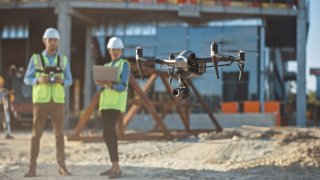Congress Should Restrict Federal Use of Chinese Drones
Recent legislation expands restrictions on foreign surveillance technology. Hopefully, it's pushing at an open door.
With the House of Representatives’ passage of the Federal Aviation Administration (FAA) reauthorization bill, Congress is poised to take another step to prohibit the government’s use of drones produced by Chinese companies. There’s a growing bipartisan consensus that government agencies should not operate surveillance drones with ties to adversary governments.
The current language of the FAA reauthorization bill would prohibit the Transportation Secretary from using Chinese or Russian drones to inspect FAA infrastructure. Last month, Sen. Marsha Blackburn (R-TN) and Sen. Mark Warner (D-VA) announced a similar, bipartisan plan to restrict the FAA’s use of drones, noting the FAA’s ownership of more than a dozen Chinese drones.
This critical step continues actions taken to reduce federal usage of Chinese drones following warnings from multiple government agencies. In 2017, the Army stopped using drones produced by the Chinese company DJI Technology Co. The Department of Homeland Security (DHS) followed in 2019 with a security alert warning about the potential cybersecurity risks of using Chinese drones. The 2020 National Defense Authorization Act then took the vital step of banning the Department of Defense’s use of foreign-made drones, and the Interior Department grounded its Chinese drones in 2020.
Last March, sixteen senators wrote a bipartisan letter to the DHS’s Cybersecurity and Infrastructure Security Agency (CISA) asking for a security review of DJI drones. “[G]iven the company’s identified connections to the Chinese Communist Party,” the lawmakers wrote, “the use of drones in such sensitive contexts may present an unacceptable security vulnerability.”
While this review is pending, Congress should comprehensively review which federal, state, and local government agencies use Chinese drones. For example, DHS grants for states and municipalities have been used to purchase drones. Past reviews have found that many state and local law enforcement and public safety agencies have purchased DJI drones, presumably using DHS funds.
But the government’s continued use of Chinese drones may soon end thanks to bills introduced in the House and Senate. The “American Security Drone Act,” co-sponsored by Sen. Rick Scott (R-FL) and Senator Warner, would prohibit the federal government from purchasing unmanned aircraft systems from covered foreign entities. In the House, the “Countering CCP Drones Act,” sponsored by Rep. Elise Stefanik (R-NY) and Rep. Mike Gallagher (R-WI), would go even further, adding DJI to the Federal Communications Commission’s blacklist. Consequently, “DJI technologies would be prohibited from operating on U.S. communications infrastructure.” This week, Senator Scott amended the 2024 National Defense Authorization Act to include the substance of the American Security Drone Act.
As one of us wrote in The Hill last month, several states have also taken steps to ban or limit the use of Chinese drones by state or local government agencies. These bans differ in important ways, including their timing and comprehensiveness. For example, Florida immediately banned using state funds to buy Chinese drones, while Mississippi and Arkansas created multi-year phase-outs. But these moves and pending legislation under consideration in both blue and red states suggest that state leaders are also taking this threat seriously.
DJI has taken notice of these recent federal and state moves to restrict the governmental use of Chinese drones. The company and other affiliates recently announced the formation of a new trade association, the Drone Advocacy Alliance, to counter the growing bans. The Alliance plans to “inform end-users about policies that could impact their ability to choose and use drones” and oppose policies that restrict access to the market based on country of origin.
This latest advocacy effort could threaten the growing bipartisan momentum for addressing the security risks of Chinese drones, particularly as the FAA bill moves to the Senate.
Last year, Congressman Gallagher lamented how DJI’s lobbying efforts succeeded in blocking similar legislation to restrict the government’s use of drones, telling National Review: “The threats posed by DJI drones are clear and well documented, and no matter how much the CCP spends on the swamp, we will continue to work to make sure these devices get nowhere near the federal government.”
As the United States works to address the cybersecurity threats of using Chinese technologies, policymakers must keep front and center the plain fact: our government is using drones produced by a company intimately linked to the Chinese government to track highly sensitive information. Lawmakers should be careful not to be influenced by the same companies that pose this threat, no matter their appeals to free-market competition.
Prohibiting the FAA from using Chinese drones for its inspection program would be a reasonable precaution. Federal agencies like the FAA, as well as state and local governments, should heed the warning of the DoD and DHS and take steps to down their Chinese drone fleets.
Lars Erik Schönander is a policy technologist at the Foundation for American Innovation.
Dan Lips is head of policy at the Foundation for American Innovation.
Image: Shutterstock.

